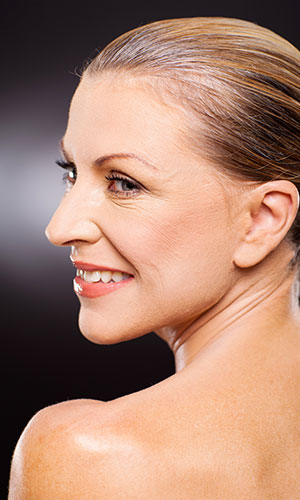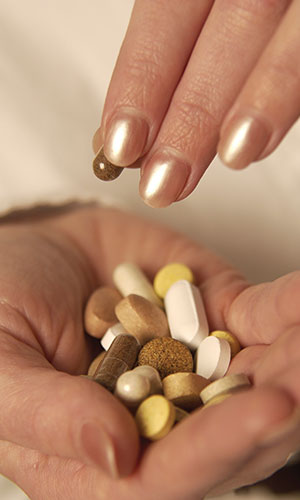The most familiar connection to red wine is the “French Paradox.” Researchers have discovered that in regions of France where the population enjoys a high-fat diet but consumes a lot of red wine with meals, the incidence of heart attacks is considerably lower than in other parts of the world.
 They now believe that the benefits of red wine — that is the resveratrol found in the red wine — extends to brain health, cancer protection and longevity, in addition to being cardio-protective.
They now believe that the benefits of red wine — that is the resveratrol found in the red wine — extends to brain health, cancer protection and longevity, in addition to being cardio-protective.
We can get the resveratrol compound from several foods, with grapes and wine being the most abundant sources. But resveratrol can also be found in seeds as well as skin and fruit of vaccinium berries such as bilberries, raspberries, blueberries and cranberries.
Here are 5 benefits of resveratrol that can help you lead a longer, healthier life:
1. It protects your heart
 Hypertension, or high blood pressure, is the silent killer. It is the most common form of cardiovascular disease, which is the leading cause of death in the United States.
Hypertension, or high blood pressure, is the silent killer. It is the most common form of cardiovascular disease, which is the leading cause of death in the United States.
But cardiovascular disease is preventable and, in many cases, reversible — and diet plays an important role.
The most important use of resveratrol is related to the protection of the blood vessels and heart, which lies in its antioxidant, anti-inflammatory, and blood flow properties.
Resveratrol helps prevent damage to blood vessels, reduces “bad” cholesterol and prevents blood clots. For example, according to a study from the European Journal of Pharmacology, resveratrol helps protect you from atherosclerosis, or plaque build up in the arteries.
2. It helps you look younger
 In an effort to look our best, we spend a fortune on facial creams, special soaps and other treatments designed to improve our appearance. But one of the most effective ways to look younger, researchers say, is to eat the foods that support the health of your skin.
In an effort to look our best, we spend a fortune on facial creams, special soaps and other treatments designed to improve our appearance. But one of the most effective ways to look younger, researchers say, is to eat the foods that support the health of your skin.
A study at Newcastle University in England demonstrates that nutrients in certain foods can help facial skin cells help fight aging. The most potent of these natural chemicals are antioxidants that support mitochondria (cellular structures that produce energy) such as resveratrol found in red wine.
It may also slow the growth of the bacteria that lead to skin blemishes.
3. It prevents or inhibits some cancers
 You may already know that calorie restriction turns on a certain set of genes called “sirtuins” that help you live linger.
You may already know that calorie restriction turns on a certain set of genes called “sirtuins” that help you live linger.
Those same sirtuins can also help you survive – and protect you against – breast cancer.
Resveratrol is the compound that turns on sirtuins. So if you want to give yourself an epigenetic advantage against cancer, it might be a wise idea to add red huckleberries, cranberries, lingonberries and blueberries to your diet.
Several studies have also noted that resveratrol makes tumor cells more susceptible to chemotherapy and radiation treatment, increasing the chances of a full recovery from all types of cancer, including aggressive tumors.
4. It protects the brain
 Inflammation is a major problem for people with Alzheimer’s. In fact, it’s what causes the brain damage that leads to the life-altering memory loss, confusion and personality changes that make the disease so scary.
Inflammation is a major problem for people with Alzheimer’s. In fact, it’s what causes the brain damage that leads to the life-altering memory loss, confusion and personality changes that make the disease so scary.
But the good news is, if you know a disease is caused primarily by inflammation, it’s easier to figure out a solution.
And, unsurprisingly, the most promising solution for Alzheimer’s may be a potent anti-inflammatory compound… one that’s been revered for its health-giving properties for over a decade now… resveratrol.
So raise a glass of wine when you next dine on a delicious dinner from the brain-healthy list of foods (below), toast your good health, good fortune and youthful brain — and enjoy a modest serving of dessert if you want.
5. It boosts insulin sensitivity
 There’s a nutrient that you already know has tremendous benefits for your heart and brain. It’s even anti-aging, but can also increase insulin sensitivity (improve insulin function) and lower blood sugar — naturally. It’s resveratrol.
There’s a nutrient that you already know has tremendous benefits for your heart and brain. It’s even anti-aging, but can also increase insulin sensitivity (improve insulin function) and lower blood sugar — naturally. It’s resveratrol.
In one study, 19 men with type 2 diabetes took a placebo or 5 mg of resveratrol (the antioxidant polyphenol) twice per day. Researchers asked the men not to eat foods with high amounts of resveratrol, such as red wine and grapes, peanuts and berries.
After four weeks, while the placebo group had not improved, men who had taken resveratrol had far fewer signs of oxidative stress, and much higher levels of a protein that helps cells absorb and use glucose. Doctors said this is the first study in humans to show that resveratrol improves insulin sensitivity.
How much is enough?
First thing to remember with resveratrol is that there are three, not two forms. There’s trans, cis and dihydro-resveratrol. All have health-enhancing properties, but the most studied and powerful for insulin function is the trans form.
Inexpensive resveratrol supplements will be in the cis-form. Even trans-resveratrol will turn into cis if stored improperly. This is why high-quality trans-resveratrol supplements cost a bit more.
Second, you want to take a high enough dose that it will have a positive effect on your whole body. That means not falling for the cheap 500 mg “resveratrol” pills and instead opting for at least 40 mg of pure trans-resveratrol each day.
https://easyhealthoptions.com/5-life-extending-benefits-resveratrol
